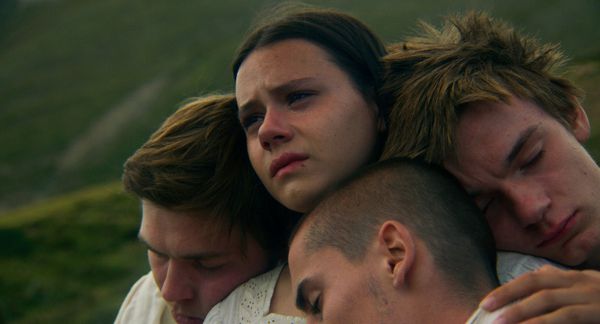Eye For Film >> Movies >> Thunder (2022) Film Review
Thunder
Reviewed by: Jennie Kermode

Switzerland does not have a large film output, but it does have one significant advantage in the international context: at least outside the city, it is difficult to make a film there which does not look stunning. Its submission for the 2024 Oscars is no exception. Its power, however, comes from the way in which it uses the landscape as metaphor whilst reflecting on the ways in which such surroundings shape the people who live there. It’s a bold film and, for that reason, it’s hard to see it winning the big awards, but more importantly it’s a film with something to say.
Elisabeth (Lilith Grasmug) has not lived in her home village since she was 12. She was sent away, then, to live in a convent and spend her life in prayer in order to protect the rest of her family. As she makes an unexpected journey back across the mountains, she wonders if she failed in her task. Her beloved older sister, Innocente, is dead. More shockingly, when she enquires as to what happened, she is told that Innocente did something unspeakable, betraying her faith – and nobody will say more.

Nobody, perhaps, except the trio of teenage boys whom Elisabeth sees hanging around in the village and surrounding land, looking for trouble. Other women avoid them, but she is curious and unafraid. Over the course of a long, hard season of farm work in which she never seems to get any closer to securing permission to return to the convent, she hears rumours and picks up further clues. She is anxious to find out the truth about the sister she loved, and it does not occur to her that this might be at odds with a prayer she spoke on that journey home: a petition to God to “keep the secrets of the world from me, for if I knew them then I would understand what the world truly is.”
If anything frightens traditional religious authorities more than the Devil, it is the idea that there might be more than one path to knowing God. Worse still if such a path might be discovered and made visible by a woman. Sin can be forgiven, but heresy is something else, even if, arguably, it means there was no sin at all. From a secular perspective, it’s the difference between dealing with someone who just breaks the rules and somebody who threatens – even implicitly, by example – to change them for everybody else. When one of the villagers, in a sudden vicious outburst, declares “We cut the throats of women like you!”, he is speaking with deep unconscious awareness that the structures which provide security in his own life are in danger of being ripped away.
Writer/director Carmen Jacquier explores this ideological and psychological clash with confidence and visual flair. Elisabeth’s vulnerability as a young woman only recently introduced to physical labour makes the power dynamics of the situation stark, but her will remains a force to be reckoned with, as does her intellect. Furthermore, Jacquier draws on hagiographic tradition in associating her closely with the natural world. Innocente’s body was found near a waterfall and there is an implication that, lacking a proper grave, she has passed into the earth so that her presence is everywhere. Established Christian society is focused on the built environment, such as it is. Wild things happen in the forest and up in the hills.
Those hills also represent a natural barrier. Most of the people of the valley rarely venture beyond them, if indeed they do so at all. They function as a metaphor for a deliberate stifling of intellectual vision. The convent plays a similar role, albeit one which Elisabeth, at that stage in the story, values for herself. In a key scene which is repeated at the very end, she is picked up bodily, having resisted, and carried out through its gate so that all she can see is the sky. It is as if, having lived in a place which offered mediated access to God, she is suddenly forced to look at Him directly, confronting beauty and terror which she is not yet ready to reckon with, and which the villagers continue to cower away from, ready to sacrifice anyone and anything in order to keep their world just the way they’re used to.
In this space there is also a musing on the liberatory power of first love, although this doesn’t take the form you might expect. Throughout the film, Elisabeth’s closest bond remains the one she has with her sister, and this, together with Innocente’s philosophy, gives it a strong feminist undercurrent. Through their connection, Elisabeth is able to achieve an understanding and a form of power which neither would have been capable of alone. There is an implication that even when an idea is destroyed it will keep springing up again, deep-rooted in this fertile landscape, ready to burst into bloom.
Reviewed on: 25 Oct 2023















